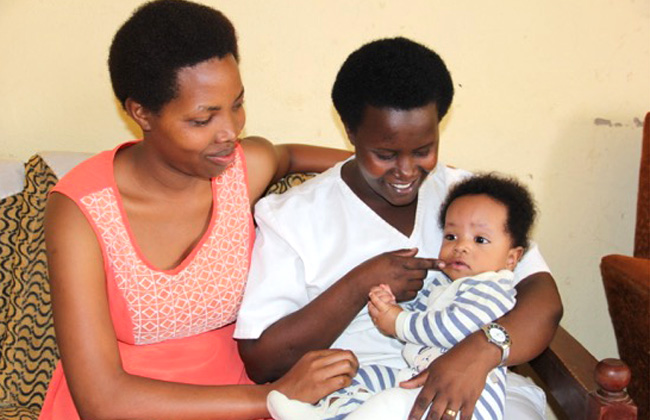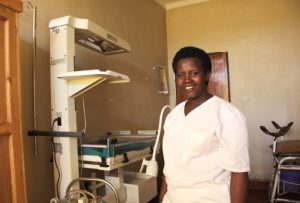
Lunch would have to wait.
Midwife Pauline Mukabasinga was just about to enjoy her midday meal on Monday, February 6, when a nurse she worked with at Kabarore Health Center called for her assistance. It was urgent.
Anna Mukashyaka, 23 years old and in labor for the first time, had just arrived, having endured a motorbike ride from her home 8 kilometers away after her water broke. The nurse who met and examined her saw that the umbilical cord had dropped and was out ahead of Anna’s baby, clearly endangering his life. She recognized right away this was going to be a complicated delivery—one that needed Pauline’s expertise.
Pauline, a nurse since 2007 and a midwife since 2016, was trained by the U.S. Agency for International Development’s (USAID) flagship Maternal and Child Survival Program (MCSP) on basic emergency obstetric and newborn care (BEmONC). As a partner with Rwanda’s Ministry of Health, MCSP builds the capacity and readiness of health care providers to provide quality routine, integrated care for mothers like Anna and newborns on the day of birth; and to manage birth complications such as pre-eclampsia, postpartum hemorrhage and resuscitation of newborns with asphyxia.
Among the 1,291 nurses and midwives in Rwanda trained to date on BEmONC, Pauline was a standout and recognized as qualified to be a mentor. She received further clinical skills building as well as an education in mentorship approaches and techniques.

Now, as a mentor, she serves as a role model and offers on-the-job professional development for others in her facility. With her coaching and guidance, nurses and midwives practice BEmONC competencies. The aim is for all to be able to competently prevent and confidently manage childbirth-related complications. Complications like the one Anna was presenting with.
Pauline’s confident demeanor calmed both Anna and her mother, who had accompanied her and had been attempting to hide the fact that she was every bit as frightened as her daughter.
Having assessed that the presentation of the baby was head and shoulder first, Pauline adroitly moved the fetus away from the cord by placing her hand into Anna’s vagina to lift the baby’s head. Her goal: to prevent the cord from being squeezed and reduce the risk of oxygen loss. She maintained this position, awkward as it was, for almost an hour until an ambulance from Kiziguro Hospital arrived to take Anna to a facility where she could deliver safely by cesarean section.
“When my hand was inside, I felt tired and was shocked,” Pauline recalls, “but since the heartbeat of the baby was still normal, I had to persist.”
A midwife from Kiziguro Hospital arrived with the ambulance, so Pauline directed her on how to place her arm inside of Anna to protect the baby during the 30-minute return trip. The midwife followed Pauline’s instructions until they arrived at Kiziguro Hospital, where Anna underwent a successful emergency cesarean section.
Today, Anna has much more than just fond memories of Pauline’s devoted care; she also has a healthy 6-month-old boy named Yvan.
“I feel proud of my child. He is so cute,” Anna said, unable to hold back tears. “I really thank Pauline for her support. My child would have been dead, if she had not helped.”
Pauline, in turn, is thankful that MCSP equipped her with the skills and confidence necessary to successfully manage emergency cases like Anna’s, thereby preventing maternal and child deaths.
Mamy Ingabire is a communications specialist for MCSP in Rwanda; Maryalice Yakutchik is a senior communications manager in Jhpiego’s Baltimore office.




